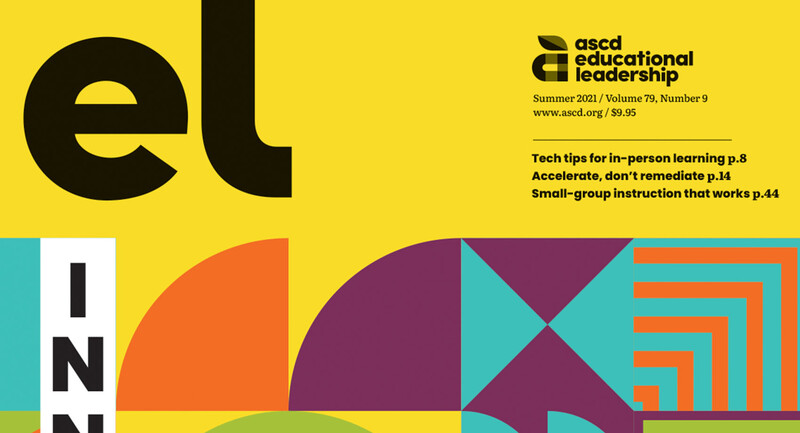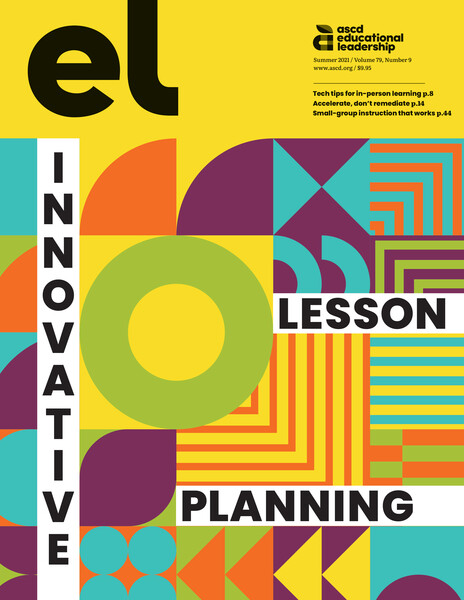In planning Educational Leadership's free, online-only summer issue each year, we typically try to pick a theme that we think will resonate with educators as they prepare for the upcoming school year. Given the situation this year, as schools seek to regroup after more than a year of pandemic-shaped learning conditions, the possibilities were both limitless and difficult to isolate. In the end, we decided to go back to the basics and focus on something that we know will be at the heart of effective schooling, whatever its shape or form: instructional planning.
As you will recognize as you read the stories in this issue, this is hardly a side topic in the current environment. Initiatives to address so-called "learning loss" or instructional gaps from disrupted school routines implicitly depend on effective lesson and unit planning. So, too, do decisions on what to carry over and build on from educators' mass experiment with remote learning. Indeed, it's likely that schools' recovery from the pandemic will entail a strong focus on the nuts and bolts—and nuances—of instructional planning in a changing landscape. To some degree, this is already happening. In our opening article, for example, Monica Burns offers tips on planning lessons that integrate some of the "tech-infused instructional strategies" educators adopted out of necessity during remote learning. For Burns, the return to "normal" shouldn't mean going back to stale "best practices" and abandoning dynamic online discussions, open-ended content-creation platforms, or digital resource curation. Instead, it's an opportunity to be more intentional about using technology in lessons—a point that is echoed in Jane E. Pollock, Laura J. Tolone, and Gary S. Nunnally's article on spurring student creativity. In his piece, instructional coach Craig Simmons tackles the other big issue facing educators as they prepare for the next school year: addressing potential instructional gaps or disruptions from the previous year. As Simmons describes it, this will entail cross-grade-level collaboration among teacher teams, prioritization of essential standards, creation of well-calibrated pacing maps, and a focus on acceleration rather than remediation—in other words, intensive and multifaceted instructional planning. "Now more than ever," he writes, "it is imperative that we are strategic and intentional in our instructional planning decisions." Adapting to Students' Needs
Other articles in the issue look at specific aspects of lesson planning that could play a critical role in adapting instruction to students' needs or making content more engaging, accessible, and "sticky" in the year ahead. Lee Ann Jung outlines practical ideas for integrating principles from Universal Design for Learning to create more inclusive and adaptable lessons. Amir Rasooli and Susan M. Brookhart offer guidelines for making small-group instruction actually work. (Hint: Don't just do it because you think it's good for students—and don't give whole-group grades.) And Henry Seton shares a plan he devised for putting "more rigor and urgency" into Socratic seminars, or student-led discussions. Summer planning will be filled with uncertainties and complexities for educators this year. But we hope this issue addresses some of your core needs, gets you excited about possibilities, and helps you focus on issues you can control, such as the quality and depth of instruction. Those are things we know kids will need in the fall.
Reflect and Discuss
Selected discussion questions for articles in this issue:
What are the most practical tools you added to your "tech tool belt" this year? How might you incorporate them into in-person learning?
What's the most valuable lesson you've learned about how to apply technology to teaching practices this year?
In what ways might a district harness educators' collective learning and use of pandemic-era technology to implement best practices across the school building?
How will vertical and horizontal PLC planning play a role in making up for your students' pandemic-related instructional gaps?
How might the REAL criteria, described here, help you determine what essential content should be covered?
What planning can you and your colleagues do prior to next school year to address potential instructional gaps?
Do you think your students got more innovative while learning during the pandemic? Why or why not?
What's one small way you might rewrite a lesson plan to encourage innovative thinking in students?
How can teachers use technology in their teaching to broaden student thinking and learning, but not overwhelm them?
For principals: Do you generally review teachers' lesson plans in the context of the overall unit the lesson is part of? How might it change your review of a lesson if you did so?
Does it resonate with you the way McTighe describes how lessons in the early, middle, and later part of a unit differ? What would need to change in your school or district for the lesson-planning process to include more emphasis on the different parts and functions of a unit?
When planning units, how do you determine which standards to cover? How might you identify only those that are the most "overarching or enduring"?
What could you do to ensure that every assignment or task is tied to one or more unit success criterion?
What would need to change in your school or department for teachers to undertake standards-based unit planning as outlined in this article?






